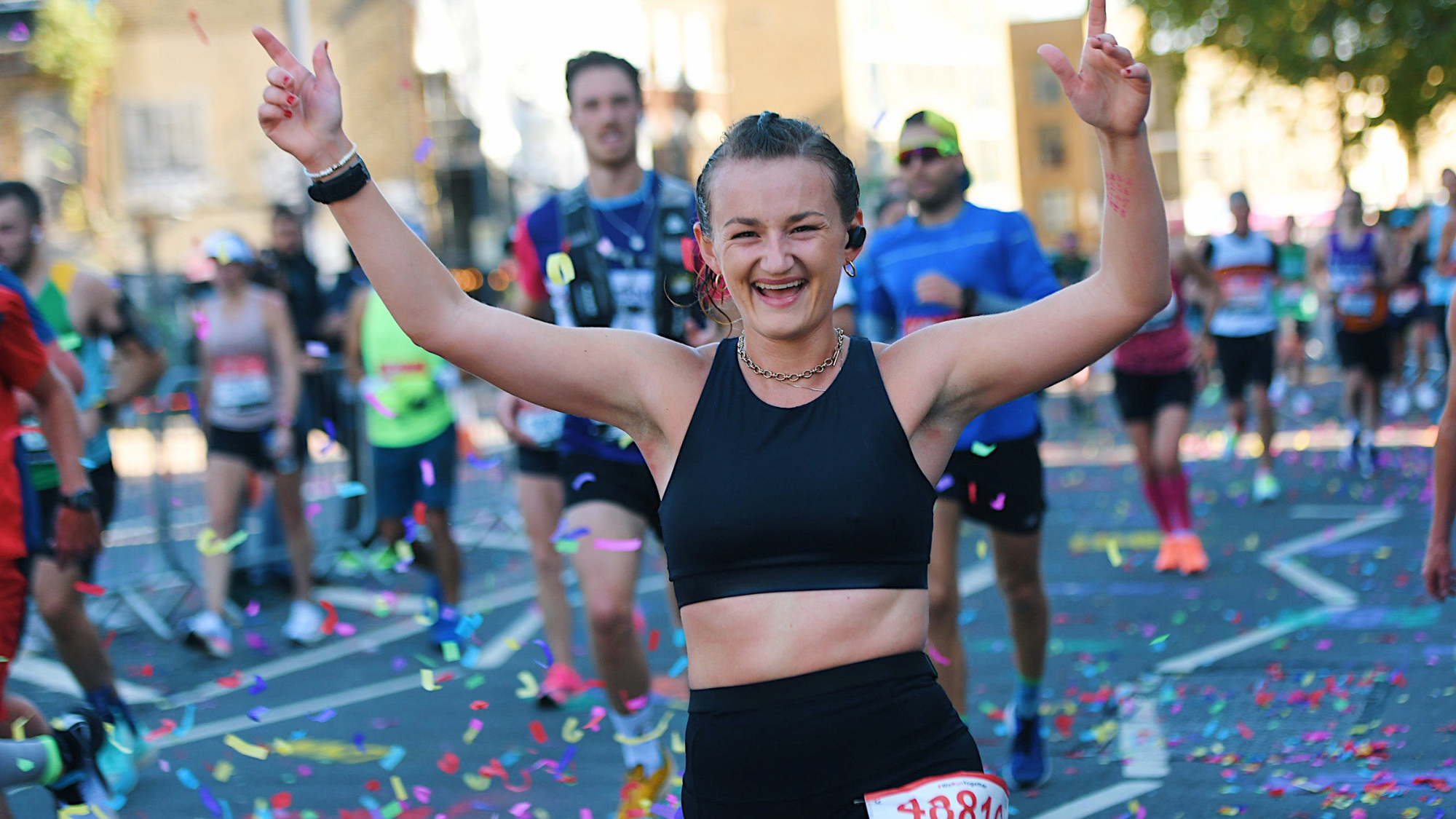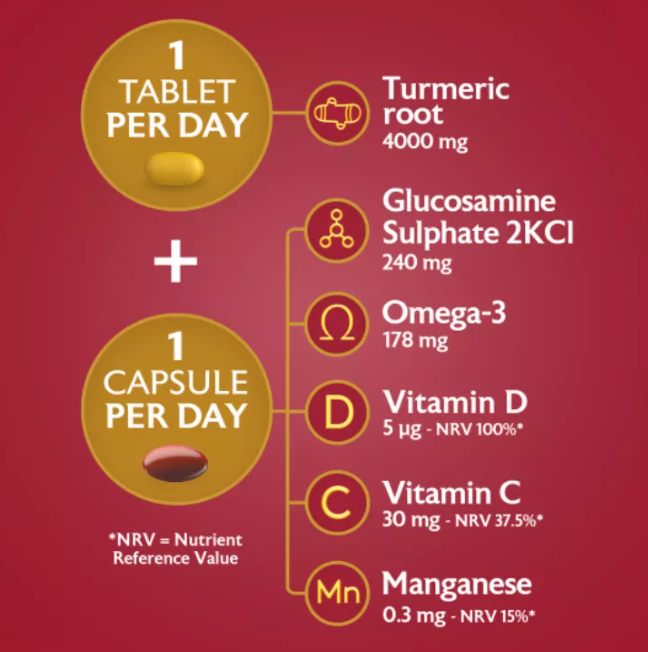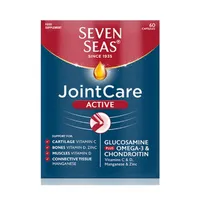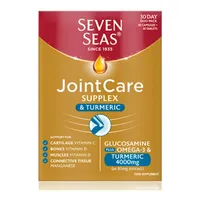I’m a marathon runner: here’s how I stop myself from getting ill while training
In partnership with Seven Seas.

In partnership with Seven Seas.
I first started running in 2015 as a way to ease exam stress and counteract boozy pub nights at uni.
Fast forward three years and I'd completed my first ever marathon, fundraising over £2000 for Cancer Research UK in the process. They say that running is infectious and they aren't wrong - despite the gruelling distance and 27 degree heat of race day, I was hooked, and have since completed a team relay run from London to Paris, four ultramarathons, seven marathons, and more halves than I care to count.
Running, to me, is escapism - it's the best way to destress at the end of the day and the easiest way to switch off when life gets a bit much. More than that, it's a way to see the world, hit your step count and get some sunshine and fresh air, while you're at it. It's not for everyone, but it's the form of fitness I really truly love.
According to ASICS UK, globally, the average completion time for a marathon is 4 hours 21 minutes – with women's specifically being 4 hours 42 minutes. Yet last October, I ran the London Marathon in a Boston Qualifying time of 3 hours and 26 minutes.
So, how did I do it - and how did I injury-proof my body through high mileage weeks, long runs, and speed sessions? Keep reading to find out - and don't miss our guides to the best running trainers, running tips for beginners, and marathon training tips, while you're here.
How I support my body through marathon training
1. Getting enough sleep
You'll have clocked the benefits of running - from boosted cardio fitness, to improved lung capacity, to increased bone density - but, fun fact: the benefits are all pretty dependent on the amount of sleep get.
That's because getting less sleep will have a knock-on effect and impact how your body is able to perform when you do lace-up. Case in point: one study conducted by the University of Stanford found that those who “increased their sleep time ran faster sprints than they did while getting their usual amount of sleep.”
Similarly, a Journal of Strength and Conditioning Research study found that not only do runners who get more sleep consistently run faster, but their rate of perceived exertion was lower, too - meaning they're more capable of pushing themselves and feeling good when doing so.
When I'm marathon training - and, well, all the time, really - I'm pretty adamant about getting eight hours shut-eye minimum. Sounds obvious, but it makes a huge difference and means I enjoy my training rather than dragging myself through it and risking injury, too. My mood is improved, I can focus and I'm more productive when I've had adequate rest. For me, it's a non-negotiable.
2. Adequate nutrition and eating enough
Marathon training isn't easy - far from it. Fitting in the runs while juggling a social life and career is difficult, as is nailing your nutrition to make sure you're eating enough to fuel the mileage.
It'll probably shock you to hear that I actually put on weight training for my first London Marathon back in 2018 - you have to eat more to fuel yourself through the mileage, but I ate practically 100% carbs (which as someone with PCOS, my body found hard to process).
Now, at the advice of the handful of nutritionists and dieticians I get to work with every day thanks to my job at MC, I aim for a balance of carbs, protein and fats with every meal, and normally eat three meals and a snack or two a day. If you're hungry when marathon training, it's important you eat - your body needs the fuel, after all.
When I trained for my first ultra at the end of 2020, leading sports dietician Renee McGregor advised aiming for 5g per kg of bodyweight of carbs if you're running for 60+ minutes a day. This has always stuck with me, as even say you run for 30 minutes, you'll need 2g per kg of body weight - that's 150g if you're a 60kg woman. I certainly wasn't eating anywhere near this, and it made a big difference to my performance when I did.
Not forgetting hydration, too. Drinking enough water is also essential for avoiding injury - if you think about how much you sweat when you're running, you'll understand why replenishing your hydration and electrolyte levels is important. I always keep a big bottle of water on my desk and by my bedside. Having a visual cue makes it easy - if you can see the water in front of you, you're less likely to forget to drink it.
3. Factoring in workout recovery
This one's important. Many runners understandably think that to run a marathon, you must run, run, run - when actually, three runs a week done well and adequate recovery will probably serve you better in the long run.
Why? Simply because your muscles need time to recover and you'll likely only burn out if you aim for many more than three or four runs a week. Obviously, this depends on your schedule and fitness levels, but when I trained for my Boston Qualifying time, I did four runs a week - an easy run, a steady run, a speed session and a long run. Having three days off a week was key not only for recovery but also for my sanity. Running is meant to be fun, after all - not take over your life and injure you in the process.

4. Working smarter, not harder
Tieing in with the above point, making sure to do less, but well, was a real learning curve of my last marathon training cycle. It meant I could go into every session and tackle it head-on, rather than being so fatigued and tired that I felt like giving up.
Strength training is also key - as our strength training for running feature highlights, it's one of the best ways to injury-proof your body and make sure you're strong enough to support yourself over a higher distance.
As my coach Andy Hobdell always reminds me, do stick to the ten per cent a week rule, too - don't just ramp your mileage up, say, 25%. If you've only ever run ten miles before, gradually increase it by ten per cent next week, and ten the week after, to make sure your body is acclimatised.
5. Supplementation
Finally, supplementation has helped me to top up on specific nutrients while marathon training. Knowing where to start can be overwhelming, but for runners, supplements like magnesium and Vitamin D are probably the most popular. Vitamin D helps support your muscles and bones (1), and it’s especially important through the winter months, while Magnesium can be great for energy (5).
Protein supports the growth and maintenance of muscle mass (3), so remember to get enough protein through diet and top up if needed through supplementation.
Always go with a reliable and trusted brand, too - Seven Seas being a great example. Their supplements are designed to support your active lifestyle (1) and keep your body functioning normally. Seven Seas JointCare product range is formulated to include Omega-3 and Vitamin D to support your whole body health (5). Omega-3 supports three major organs in the body: the heart, brain and eyes (2). Seven Seas Joint Care range also contains vitamin D to contribute to the maintenance of normal bones and muscle function (1).
Seven Seas Jointcare Active - £10.80 for 60 capsules
Seven Seas Jointcare Supplex & Turmeric - £12.66 for 30 capsules
As with all supplements, always speak to a doctor before starting anything new. And in the meantime - happy training.
1. Seven Seas JointCare Supplements contain: Vitamin D which supports normal functioning muscles and normal bones. Vitamin C for the normal formation of collagen for the normal function of cartilage. Manganese for the normal formation of connective tissues or Copper contributes to the maintenance of normal connective tissues.
2. A daily intake of 250mg EPA (Eicosapentaenoic Acid) and DHA (Docosahexaenoic Acid) helps support normal heart function. 250mg DHA daily helps support normal vision and brain function.
3. Protein contributes to the growth and maintenance of muscle mass.
4. A daily intake of 250mg EPA (Eicosapentaenoic Acid) and DHA (Docosahexaenoic Acid) helps support normal heart function. 250mg DHA daily helps support normal vision and brain function. Vitamin D helps support the normal function of muscles, immune system, normal bones and plays a role in cell division. Food supplements must not substitute a balanced diet and healthy lifestyle.
5. Magnesium contributes to normal energy-yielding metabolism
Food supplements must not replace a varied, balanced diet and a healthy lifestyle.
Celebrity news, beauty, fashion advice, and fascinating features, delivered straight to your inbox!

Ally is Marie Claire UK's Senior Health and Sustainability Editor, a well-regarded wellness expert, ten-time marathoner, and Boston Qualifying runner.
Utilising her impressive skillset and exceptional quality of writing, she pens investigative, review and first-person pieces that consistently demonstrate flair and originality.
As well as writing, Ally manages a team of freelancers, oversees all commissioning and strategy for her pillars, and spearheads the brand's annual Women in Sport covers, interviewing and shooting the likes of Mary Earps, Millie Bright, and Ilona Maher. Shortlisted for three BSMEs and winning one in 2022, Ally lives and breathes her verticals: her eye for a story and connections within the wellness sphere are unrivalled. Follow Ally on Instagram for more.
-
 Pieter Mulier Has Just Been Appointed the Chief Creative Officer of Versace
Pieter Mulier Has Just Been Appointed the Chief Creative Officer of VersaceThe Alaïa alumnus will commence his role in July
-
 Turns Out, Your Hair Porosity Is Just as Important When Shampoo Shopping as Type and Colour
Turns Out, Your Hair Porosity Is Just as Important When Shampoo Shopping as Type and ColourYour guide to low and high porosity strands
-
 This Is What You Should Be Doing to Rain-Proof Your Hair, According to Experts
This Is What You Should Be Doing to Rain-Proof Your Hair, According to ExpertsPrepare to take notes
-
 How to manage skin changes during perimenopause and menopause, according to an expert
How to manage skin changes during perimenopause and menopause, according to an expertIn partnership with Vichy
-
 5 easy ways to eat a more plant-based diet, according to chef Bettina Campolucci Bordi
5 easy ways to eat a more plant-based diet, according to chef Bettina Campolucci Bordi -
 Give your home a new season glow-up with the latest autumn-winter collection from M&S
Give your home a new season glow-up with the latest autumn-winter collection from M&SPromotional feature with M&S
-
 Here's how to maintain a pristine outdoor space
Here's how to maintain a pristine outdoor spaceIn partnership with Kärcher
-
 5 eco-conscious questions to ask yourself before buying something new
5 eco-conscious questions to ask yourself before buying something new -
 How I want to help elevate the profile of women in cycling
How I want to help elevate the profile of women in cyclingKeira McVitty on recovering from illness, YouTube and why cycling is a sport that keeps on giving
-
 These are the key ways to go from passion to profit, straight from an expert
These are the key ways to go from passion to profit, straight from an expertIn partnership with GoDaddy
-
 Why cycling is more than a hobby – it protects my family’s health
Why cycling is more than a hobby – it protects my family’s healthIn partnership with SKODA


